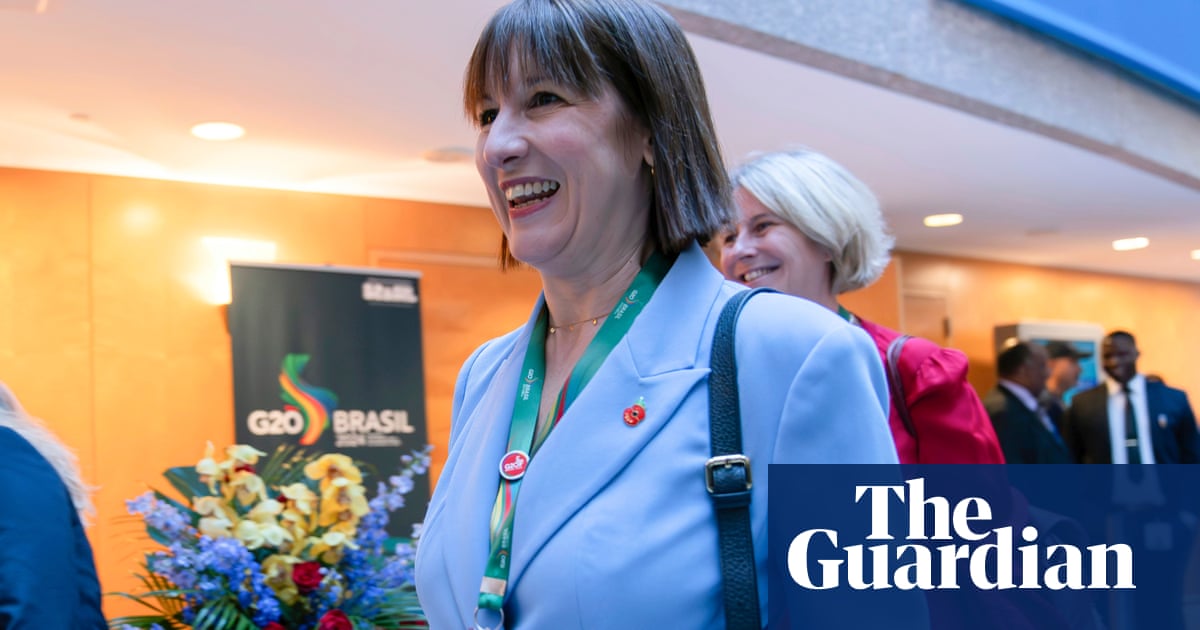Speaking on Tuesday in Washington, the chief economist of the International Monetary Fund suggested he was relaxed about higher debt levels to fund public investment. He made the comment in answer to a question about the UK at the annual meetings of the IMF and World Bank, but it felt like a highly choreographed piece of theatre.
Rachel Reeves was due to arrive at the meetings in the US capital the following evening and the IMF was aware that the UK chancellor was going to announce a significant overhaul of Britain’s budget rules to allow for more investment by the state.
In one session after another, IMF senior officials repeated the same message – the Washington-based organisation was a great believer in the power of public investment to drive growth.
There was also a sizeable upgrade to Britain’s growth rate this year, giving the sense of an economy bouncing back after some difficult years.
It seemed like a landing strip was being prepared for Reeves in Washington to explain how her plans would further boost growth and improve living standards.
A backdrop of a balmy US capital bathed in autumnal sunshine provided an opportunity for the chancellor to relax away from Westminster – after a difficult first 100 days of a Labour government and with less than a week to go before she presents her first budget.
Reeves said there would be new rules in her budget next week governing Treasury borrowing, allowing debt levels to increase – experts say by up to £50bn – to facilitate investment in Britain’s crumbling infrastructure.
IMF staff refused to comment directly on speculation about what might be in the chancellor’s budget, but they didn’t need to. They endorsed the principle and that was enough for Reeves to say she had the backing of a key arbiter in the world of economic planning.
In one instance of this newfound affection, Vítor Gaspar, director of the department that monitors budget plans at the IMF, said: “Our report emphasises that public investment should be protected in budgetary procedures that foster sound macroeconomic performance.
“The fact that that issue is very much at the centre of the debate in the UK right now is very much welcome.”
Reeves also met Janet Yellen, US treasury sectary, for a private chat on her first morning at the meetings in Washington, and the two posed for a relaxed photo with the European Central Bank boss, Christine Lagarde, and Canada’s deputy premier, Chrystia Freeland, during a break in proceedings at a G20 meeting of finance ministers and central bankers also being held in Washington.
These are powerful allies for Reeves as she seeks to regain the confidence of international institutions after the Liz Truss mini budget debacle in 2022.
The conversation with each one might have been a little more tense had Reeves not announced that the UK was rejoining the economic mainstream and putting a greater emphasis on investment and cooperation between nations.
Ukraine was also on the chancellor’s mind when she arrived in Washington, and after meeting Yellen, Reeves spent time with Ukraine finance minister, Sergii Marchenko, who was in town to receive $1.1bn from the IMF. Britain is to lend Ukraine an additional £2.26bn.
The IMF did introduce some caution in its commentary.
Pierre-Olivier Gourinchas, the IMF’s chief economist and director of research, said that when countries have elevated debt levels, when interest rates are high, and growth is “OK but not great”, there is a risk that “things could escalate or get out of control quickly”.
The UK is mentioned in a review of government finances as one of the countries that have an almost endless list of underfunded public services and welfare commitments, putting debt payments on an upward trajectory.
The momentum is such that UK borrowing is forecast to grow – without any policy changes – from 100% in 2023 to 108.3% in 2029. That compares with a rise from 123.4% to 131.1% the IMF expects for the G7 as a whole.
“We believe it’s very important to bring public debt under control. It’s very important to control for public debt risks,” Gaspar said.
The IMF has used every one of its bi-annual meetings since the 2008 crash to warn about rising debt levels. Only a handful of countries have responded to the organisation’s entreaties.
Next year global government borrowing is forecast to hit £100tn. In 2023 the total income of the global economy was $105tn.
Much of the rise in government debt can be blamed on the world’s two largest economies – the US and China.
They have both sought to revive their economies with extra borrowing and are now deeply in debt.
What would the election of Donald Trump mean for US debt levels? According to some assessments they would soar again, as they did during his last presidency when funds for huge tax cuts were borrowed.
Trump is also feared by the IMF’s top brass for the havoc he could bring to international trade after his promises of steep tariff increases on goods imported into the US. And not just from China, but Europe as well.
The UK hopes it can avoid Trump’s glare should he be elected on 5 November. Keir Starmer this week insisted he could maintain a “good relationship” with Trump after the Republican candidate’s campaign accused Labour of “blatant foreign interference” in the US election, over Labour officials travelling to US battleground states to volunteer for his Democratic rival, Kamala Harris.
Reeves avoided the controversy on her trip to Washington this week, but good relations with the US are top of Labour’s agenda. It needs whoever is in the White House to keep offering favourable trade terms.
Having won over the IMF for now, from an international perspective the next task will be to keep the Harris or Trump president on side.

